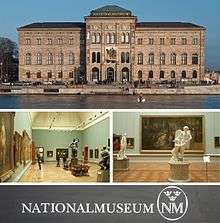Nationalmuseum
| Nationalmuseum | |
 | |
| Established | 1792/1866 |
|---|---|
| Type | National gallery |
| Director | Berndt Arell |
Nationalmuseum (or National Museum of Fine Arts) is the national gallery of Sweden, located on the peninsula Blasieholmen in central Stockholm.
The museum's benefactors include King Gustav III and Carl Gustaf Tessin. The museum was founded in 1792 as Kungliga Museet ("Royal Museum"), but the present building was opened in 1866, when it was renamed the Nationalmuseum, and used as one of the buildings to hold the 1866 General Industrial Exposition of Stockholm.
The museum is home to about half a million drawings from the Middle Ages to 1900, prominent Rembrandt and Dutch 17th-century collection, and a collection of porcelain items, paintings, sculptures, and modern art as well. The museum also has an art library, open to the public and academics alike.
The current building, built between 1844 and 1866, was inspired by North Italian Renaissance architecture. It is the design of the German architect Friedrich August Stüler, who also designed the Neues Museum in Berlin. The relatively closed exterior, save for the central entrance, gives no hint of the spacious interior dominated by the huge flight of stairs leading up to the topmost galleries. The museum was enlarged in 1961 to accommodate the museum workshops. The present restaurant was instated in 1996. The museum building closed for renovation in 2013 and is scheduled to reopen in 2018.
Holdings
- The Conspiracy of Claudius Civilis by Rembrandt
- Midvinterblot by Carl Larsson
- Vid bäcken by Peter Adolf Persson
See also
References
- Johan Mårtelius (1999). "Norra innerstaden". Guide till Stockholms arkitektur (2nd ed.). Stockholm: Arkitektur Förlag AB. p. 67. ISBN 91-86050-41-9.
External links
| Wikimedia Commons has media related to Nationalmuseum Stockholm. |
Coordinates: 59°19′43″N 18°04′42″E / 59.32861°N 18.07833°E